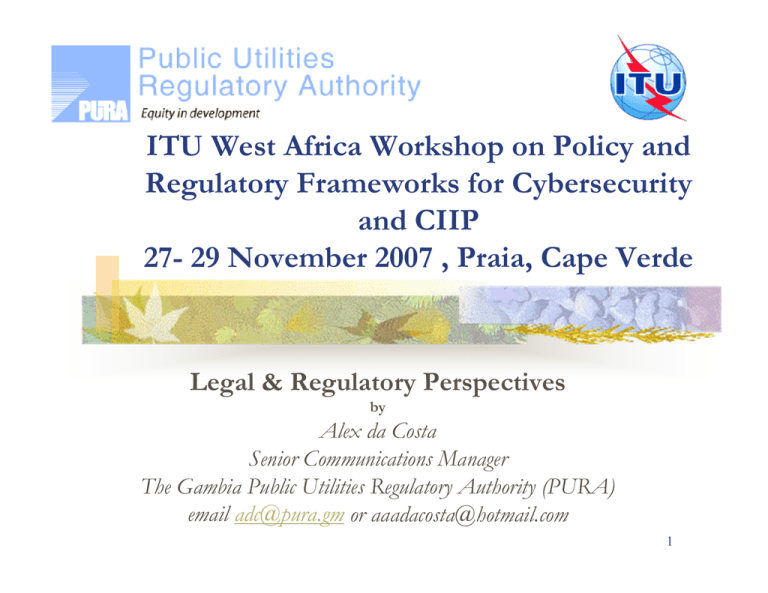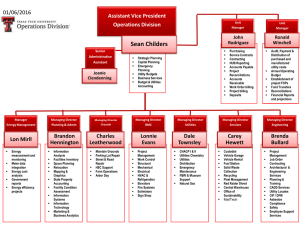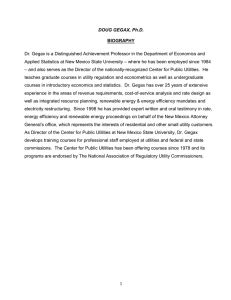ITU West Africa Workshop on Policy and Regulatory Frameworks for Cybersecurity 27-
advertisement

ITU West Africa Workshop on Policy and Regulatory Frameworks for Cybersecurity and CIIP 27- 29 November 2007 , Praia, Cape Verde Legal & Regulatory Perspectives by Alex da Costa Senior Communications Manager The Gambia Public Utilities Regulatory Authority (PURA) email adc@pura.gm or aaadacosta@hotmail.com 1 Outline Introduction Legal Foundation Regulatory Development Key Challenges Concluding Remarks 2 Introduction -My Employers The Gambia Public Utilities Regulatory Authority (PURA) Enactment of the PURA Act in 2001 (An Umbrella Act) by the National Assembly for the establishment of a multi-sector regulatory authority to regulate public utilities in the Telecommunications, Broadcasting, Electricity, Water & Sewerage and Transportation sectors; Was “concieved” by the Private Sector Participation and Regulatory Framework Study by the Institute for Public Private Partnership (IP3) in 2003 and; Was “born” in 2004, with the appointment of its Board of Commissioners and first Director General and subsequent appointment of Directors in 2005. 3 Legal Foundation Modification of existing laws Creation of new ones Law Reform/Culture of cyber security 4 Regulatory Development Regulation simply put is direct government control over specific sectors of the national economy Governments all over the world based on their unique national identity choose to exercise such control for a variety of reasons: 5 Regulatory Development e.g. The pharmaceutical industry is regulated to protect public health; the ownership of firearms is restricted in the interests of public safety and; the use of the electromagnetic spectrum is regulated to facilitate orderly radio communications. 6 Regulatory Development Regulation by extension is also an act to protect people, institutions and legal entities from abuse or dominance likely to occur in a competitive market where choice can be exercised to purchase, trade or transact goods and/or services from one another 7 Regulatory Development Critical Success Factors for Regulatory Development Independence Autonomy Authority Accountability Stakeholder Consultation 8 Regulatory Development Some Functions of a Regulator: Provide guidelines on rates and fees for the provision of regulated public services; examine rates and fees chargeable for the provision of regulated public services; protect the interest of consumers and of public utilities; monitor and enforce standards of performance by public utilities; 9 Regulatory Development initiate and conduct investigations into standards of services by public utilities; promote fair competition among public utilities; conduct studies relating to economies and efficiency in the provision of regulated public services to consumers; collect and compile data on regulated public services and their provision necessary for the performance; provide advice in respect of regulated public services and their provision; 10 Regulatory Development maintain a register in electronic form of public utilities and the services they provide; publish, in such manner as it considers appropriate, information relating to its functions and activities; recommend and administer, in accordance with its parent Act and other sector specific legislation a licensing system in respect of public utilities; 11 Regulatory Development provide advice or assistance to a public utility to assist or enable the public utility to comply with relevant Acts, Regulations or licences; prepare or cause to be prepared any relevant documentation (including drafts of any required legislation) necessary to regulate in accordance with any parent Act or legislation; perform such other functions as may be imposed on it by any other legislation 12 Key Challenges In The Gambia: The negative is that there is no existing legislation on cyber security – We are at ground Zero! The positive is that we are ideal as a nation state to be a pilot for a model that could be refined, adjusted and developed for others. Views on this most welcome! 13 Key Challenges In Other countries: The need for more proactive sensitisation at all levels from Regional through to National and Local Government levels Absence of laws and in some instances a robust, independent and impartial regulator The need for awareness to be targeted towards the key decision makers The need to identify an ECOWAS/ITU action oriented task group to focus on the 5 key challenges: 14 5 Key challenges and recommended approach 1. 2. 3. 4. 5. National Strategy development Forge a strategic collaboration between Government and Industry Institute a legal foundation and framework Put into place a national incident management capability for watch warning response and recovery Raise national awareness….and don’t forget continuous training and skills upgrade 15 Concluding Remarks Effective cyber security requires the full cooperation and participation of all stakeholders (Globally) as consumers, utilities, etc and most importantly the three arms of the State. 16 I THANK THE ITU FOR THE GOOD WORK THEY DO AND GIVING ME THIS OPPORTUNITY TODAY. I ALSO THANK YOU ALL OF YOU FOR YOUR KIND ATTENTION 17




